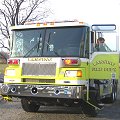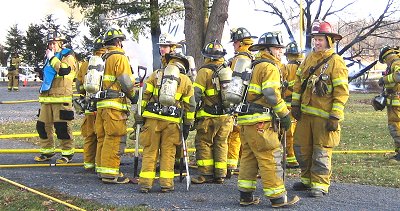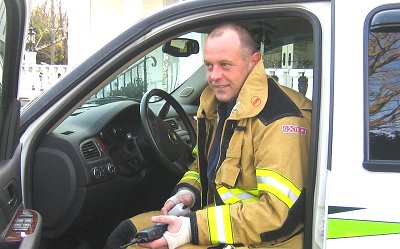- By Dan Veaner
- News
 Print
Print  1098 emergency calls went out to the Lansing Fire Department in 2008. That was up 4.27% from 2007, a smaller rise than last year's 15%, but continuing an upward trend. 41% of those were fire calls, with the remaining ones EMS (Emergency Medical Services). "Call volume keeps going up a little bit every year," notes Lansing Fire Chief Scott Purcell. "We noticed a big jump last year. This year it rose by 45 calls."
1098 emergency calls went out to the Lansing Fire Department in 2008. That was up 4.27% from 2007, a smaller rise than last year's 15%, but continuing an upward trend. 41% of those were fire calls, with the remaining ones EMS (Emergency Medical Services). "Call volume keeps going up a little bit every year," notes Lansing Fire Chief Scott Purcell. "We noticed a big jump last year. This year it rose by 45 calls."When a 911 call comes into the the Tompkins County Emergency Response center a dispatcher puts out a call to fire fighters in that municipality. If they do not respond, the towns and villages have mutual aid agreements that bring other fire departments into neighboring towns. Lansing responded to all but one of the 450 fire calls last year, and to all but 98 EMS calls.
Fire officials say that about matches statistics for any fire department, and the number of 'no responses' to EMS calls are misleading, because not all of the EMS calls really require a response from Lansing.

"If you look at it across the county and across the state we're probably as good or equal to the rest of the departments," says Fire Commissioner Jeff Walters. "Percentage-wise they are about the same. They might want us to go to a doctor's office for mental health, but they are already at the doctor's office. It's a poor use of manpower when they're in the doctor's office and Bangs is coming."
Since Lansing no longer has its own ambulance service, assisting Bangs Ambulance is key. They let Bangs park an ambulance at the Oakcrest Road fire station in the Village of Lansing to make sure they are nearby when EMS calls come in. "If we don't respond to EMS calls Bangs will," says Fire Commissioner Larry Creighton. "We try to keep them as close as possible."
The response rate is remarkable because the fire department is made up entirely of volunteers. When calls come in those who can respond, either going to the nearest fire station first to get equipment and trucks, or driving directly to the emergency.
Like most volunteer fire departments, Lansing struggles to find volunteers who are willing to put in the time for training, and to put their lives on the line responding to emergencies. Not all department members are emergency responders -- many fill support positions. Of those who are qualified to respond, only a fraction actively participate, not unusual for any volunteer organization.
To encourage volunteers to participate, the department assigns points to activities including training, responding to emergencies, meetings, and so on. When volunteers earns enough of the right kind of points during the year they qulify for service awards, money that goes into a kind of retirement fund. "We have about 60 emergency responders who are qualified to go on calls, but you'll typically see in the service awards every year it's the same 20 to 25 people," Purcell says. "We have about 25 people we can count on on a regular basis."

Lansing Fire Chief Scott Purcell
Purcell says that with rising emergency calls and limited resources fire departments across the country are instituting systems of triage to determine which EMS calls to respond to. County-wide, chiefs are working on a system that categorizes alpha calls as non-life-threatening general illness, beta calls as emergency calls, and delta calls for ALS (Advanced Life Support) calls that are true emergencies.
"Ithaca is not responding to any alpha calls now," he says. "Etna and Freeville are not responding to any non-emergency calls either. On the other hand you've got McLean that says they want to go on all of them because they're getting tax dollars for a service and they want to be able to provide the service. If they are not providing the service the people in the town are going to wonder why they're not there when they call them. So it's a double edged sword whether you go out the door or you don't."
Purcell says that Lansing hasn't decided which way to go. But he says that the department may have to skip alpha calls to keep volunteers coming when they are really needed. As in the 'boy who cried wolf' story, he fears they might not come to real emergencies if called to respond when they aren't really needed. "It's a waste of manpower," he says. "If you are sending them out the door for calls like that then when you do need them they're not going."
Officials say that the public can help the department's ability to respond in two key ways: keep working smoke detectors in homes and offices, and mark street numbers clearly on mailboxes and houses. Purcell says the department has a few smoke detectors available for those who can't afford them, and that they are available inexpensively in local stores. "That was the reason for that fire in Oswego County (two weeks ago)," Purcell he remarks. "Eight people died because they didn't have working smoke detectors in the house."
----
v5i3



